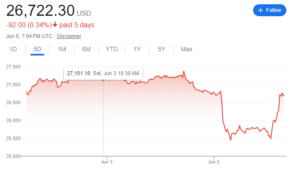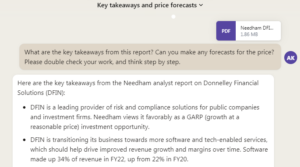Repeat after me:
Cryptocurrencies are illiquid assets on unregulated exchanges traded by sketchy individuals.
It’s a hugely profitable market that remains virtually lawless. As digital assets become increasingly popular and investors make more money, so will the cyber-creeps that steal it from live to steal from them.
Even I’ve had my crypto stolen before. I stupidly had some MetaMask keys stored in my phone, which got hacked, and poof…200K, gone like the wind.
And there isn’t any recourse, either. Once that money is gone…it’s gone for good. That’s why I’m in favor of at least some market regulation in crypto, because until then…your security is your responsibility
We’re all vulnerable, but we don’t have to be victims. There are safety measures you can take to avoid theft, scams, and sketchy individuals.
Protect yourself now or lose your money for good…
Never Give Out Your Private Keys
Your cryptocurrency wallet keys are the most critical part of your cryptocurrency security. They grant access to your digital assets. Anyone with access to your keys can access your wallet.
Follow these tips to protect your keys:
- Store your private keys offline, preferably on a hardware wallet or other cold storage devices. This will keep them out of hackers’ reach. (I tested the most popular hardware wallets here.)
- Never share your private keys with anyone, even if they claim to be from a reputable company.
- Regularly back up your private keys, and store the backup in a safe and secure location.
- Use strong, unique passwords to encrypt your private keys and change them regularly.
Beware of Hackers and Scammers
Hackers are always on the lookout for vulnerabilities in your wallet or exchange security. To prevent them from stealing your cryptocurrency:
- Use strong, unique passwords for all your online accounts and enable two-factor authentication (2FA) wherever possible.
- Keep your computer and mobile devices up-to-date with the latest security patches.
- Install reputable antivirus software and ensure it’s always updated.
- Be cautious when using public Wi-Fi networks, as they can be a breeding ground for hackers.
Learn How to Spot Scams and Sketchy Links
The cryptocurrency space is rife with scams and sketchy links. To avoid falling prey to them:
- Always double-check URLs and email addresses to ensure they are from legitimate sources.
- Be wary of unsolicited emails, messages, or calls claiming to be from cryptocurrency companies or exchanges.
- Don’t click on suspicious links or download attachments from unknown sources.
- Verify the authenticity of cryptocurrency giveaways and promotions before participating.
Keep Your Guard Up on Discord and Other Platforms
The American Institute for Crypto Investors Discord can be a valuable resource for learning and connecting with other crypto enthusiasts. However, online crypto communities are also hotspots for scammers. To avoid falling victim:
- Be cautious when joining new Discord servers or other online communities. Research their reputation before engaging.
- Don’t share personal information, such as email addresses or wallet addresses, in public channels.
- Be skeptical of unsolicited direct messages, especially from users claiming to represent exchanges or other cryptocurrency services.
- Report suspicious behavior to moderators or platform administrators to help protect others in the community.
Remember that your digital assets are your responsibility. Only you can protect yourself, and if you don’t-there’s nothing you can do to recover your money.
I want you all to see the day when your portfolio does that 10X, 100X, and 1,000X jump that we’ve been working towards. But you need to make sure your assets make it that far.
Want to learn more about the types of crypto scams to look out for? I’ve got more examples for you here.
Remember folks-don’t click weird links, use two-factor authentication wherever you can, and never…ever…give away your private keys.
Stay liquid,


Nick Black
Chief Crypto Strategist, American Institute for Crypto Investors
- SEO Powered Content & PR Distribution. Get Amplified Today.
- Platoblockchain. Web3 Metaverse Intelligence. Knowledge Amplified. Access Here.
- Minting the Future w Adryenn Ashley. Access Here.
- Source: https://aicinvestors.com/article/how-to-avoid-the-crypto-creeps/
- :is
- $UP
- 1
- 100x
- 2FA
- a
- About
- access
- Accounts
- addresses
- administrators
- After
- All
- also
- always
- and
- antivirus
- Antivirus Software
- any
- anyone
- ARE
- AS
- Assets
- At
- Authentication
- authenticity
- auto
- back
- Backup
- BE
- because
- become
- been
- before
- by
- Calls
- CAN
- cautious
- change
- channels
- claim
- claiming
- click
- Cold Storage
- Communities
- community
- Companies
- company
- computer
- Connecting
- critical
- crypto
- crypto communities
- Crypto investors
- crypto scams
- cryptocurrency
- Cryptocurrency Wallet
- day
- Devices
- digital
- Digital Assets
- direct
- discord
- Dont
- download
- either
- emails
- enable
- engaging
- ensure
- enthusiasts
- especially
- Even
- examples
- exchange
- Exchanges
- Falling
- favor
- For
- from
- Give
- giveaways
- good
- grant
- Ground
- Guard
- hacked
- hackers
- Hardware
- Hardware Wallet
- Hardware Wallets
- Have
- help
- here
- How
- How To
- However
- HTTPS
- Hugely
- i
- in
- increasingly
- individuals
- information
- Institute
- Investors
- IT
- joining
- jump
- Keep
- keys
- latest
- LEARN
- learning
- like
- links
- Liquid
- live
- location
- Look
- lose
- make
- Market
- measures
- messages
- MetaMask
- Mobile
- mobile devices
- money
- more
- most
- Most Popular
- Need
- networks
- New
- now
- of
- offline
- on
- online
- online communities
- online crypto
- only
- or
- Other
- Others
- part
- participating
- Passwords
- Patches
- personal
- phone
- platform
- plato
- Plato Data Intelligence
- PlatoData
- Popular
- portfolio
- possible
- Premium
- prevent
- private
- Private Keys
- profitable
- Promotions
- protect
- public
- reach
- Recover
- regularly
- Regulation
- remains
- represent
- reputable
- reputation
- research
- resource
- responsibility
- safe
- Safety
- Scammers
- scams
- secure
- security
- Services
- Share
- skeptical
- So
- Software
- some
- Sources
- Space
- Spot
- stolen
- storage
- store
- stored
- Strategist
- strong
- such
- suspicious
- Take
- that
- The
- theft
- their
- Them
- These
- this
- tips
- to
- towards
- traded
- types
- unique
- unsolicited
- up-to-date
- updated
- use
- users
- Valuable
- Victim
- victims
- virtually
- Vulnerabilities
- Vulnerable
- Wallet
- Wallets
- we
- which
- Wi-fi
- will
- wind
- with
- working
- you
- Your
- yourself
- zephyrnet












